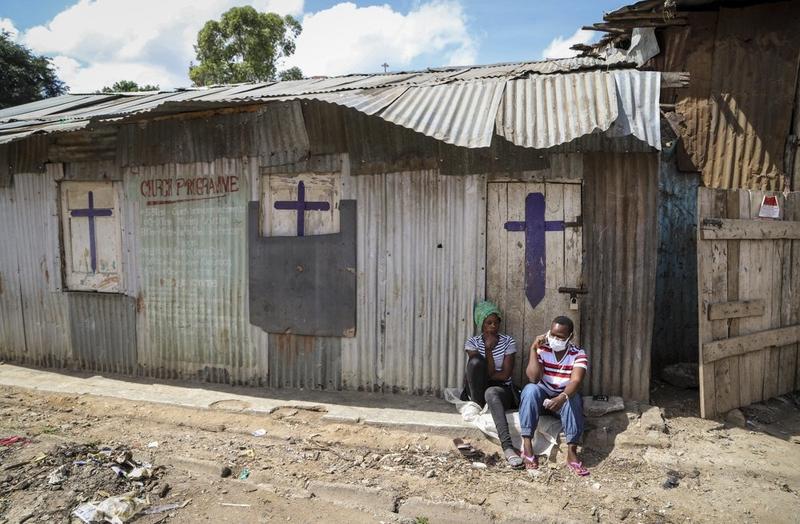 In this April 12, 2020 file photo, two residents sit outside a closed church, after religious public services were stopped to limit the spread of the coronavirus, in the Mathare slum of Nairobi, Kenya. (PATRICK NGUGI / AP)
In this April 12, 2020 file photo, two residents sit outside a closed church, after religious public services were stopped to limit the spread of the coronavirus, in the Mathare slum of Nairobi, Kenya. (PATRICK NGUGI / AP)
The World Bank has urged Niger to focus on health measures, job protection and livelihoods to mitigate the impact of the coronavirus pandemic, which has already pushed close to 270,000 people into poverty this year.
The World Bank said in a report titled "Niger-Economic and Poverty Update under COVID-19" that the West African country should focus on health measures to save lives in the near term.
The report published on Thursday added the country should reallocate expenditures to fund the implementation of measures to protect jobs and livelihoods. This is in addition to reviving the economy, in particular through policies to promote greater access to clean water and electricity. The report said the country's population has been severely impacted by the combined effects of the pandemic, the global recession, and an economic slowdown.
The shocks led to losses in jobs and incomes, an increase in some food prices, and disruptions in the system providing social protection and delivering basic services, especially in health and education services.
ALSO READ: Collaboration key to fight poverty
Poverty growing
As a result, the poverty rate is projected to increase to 42.1 percent in 2020 from 40.8 percent in 2019.
It is of vital importance to expand and increase social assistance programs such as cash transfers to vulnerable groups.
Joelle Dehasse, the World Bank's country manager for Niger
The report warned the pandemic's significant impact on the economy could trigger a recession if the many risks to economic activity materialize.
So far the virus has infected 1,218 people and killed 69 in Niger.
Joelle Dehasse, the World Bank's country manager for Niger, said the disease has disrupted the lives and livelihoods of Nigerians.
"We must redouble efforts to reduce poverty and inequality and to restore and sustain human capital gains. To this end, it is of vital importance to expand and increase social assistance programs such as cash transfers to vulnerable groups, so as to offset this loss of income and boost household resilience to shocks," he said in a statement on the launch of the report.
Paolo di Lorenzo, senior economist at the World Bank, said households and enterprises have borne the brunt of the combined effects of the pandemic on economic activity.
This placed the hotel, transport, and tourism sectors, as well as small and medium-sized enterprises, in a particularly vulnerable situation following the drop in demand.
READ MORE: Joint statement of China-Africa summit on COVID-19 fight
Contact the writer at edithmutethya@chinadaily.com.cn


